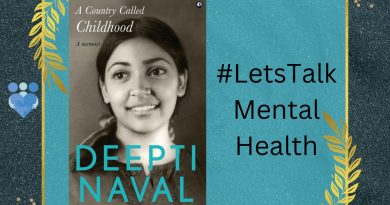Unravel: Improv That Shows Us How to Listen
By Aqseer Sodhi
Dear Kaivalya Plays,
Congratulations on a fine, heartful attempt at showing us what improv theatre can do for our mental health. The matinee show of Unravel that I attended was about two hours long, with one hour of improv games from behind the fourth wall, and 45 minutes of performance to us, and with our interaction. There were 53 of us in the audience, eight of you in the cast, and four in the crew. Fittingly, you were the first to perform at LTG Auditorium’s cosy new space.
You wanted to show, and not tell us what improv can do for mental health. You showed us improv games, and you told us your stories. That felt choppy. Like you wanted to keep it light and real simultaneously. I don’t know if your audience left feeling inspired or equipped enough to transfer the lessons from those games into their lives. That’s why I wish you had used the performance space to show us how improv helped you, changed your lives. You, who found yourself bawling 15 minutes into your first therapy session, and you, who watched his father slip into depressive episodes thrice. Hearing your stories made me feel frustration, resonance, sadness and a sense of incompleteness.
Was it deliberate on your part to specify that you only went to therapy because it was mandated as part of your course? I will never know. Does your father appreciate how much your attitude to his illness has changed over time? We will never know.
ALSO READ: ON ART, POETRY AND SELF-CARE
Having said that, you made me laugh, hard. And as a facilitator, I got some ideas for my workshops. Most importantly, watching your rehearsed awkwardness helped me step into my own. I’m a little louder now, a little sillier, a little more inspired.
Let me close by telling you what I learnt about improv games and mental health.
Two basic principles: “yes, and” and make your co-actor look good. “Yes, and” means that no matter what my friend says to me, I have to acknowledge that I heard it, and build on it. So if you say “I can’t do life anymore, I want to kill myself,” I say “Yes, I hear that you feel hopeless, and I wish I could help, I just don’t know how.”
Editor’s Note: If you or anyone you know feels helpless or hopeless, please do reach out to a trained professional for help. We have shared some suicide prevention helplines here
“Yes, and” is a tool that forces us to listen. It gets us out of the problem solving mode of “no, but” and makes us acknowledge another person’s suffering. We are better equipped to support each other if we learn this one thing from improv theatre.
Make your co-actor look good is another useful principle because it forces us to shift our focus to the other person in the conversation, the person that needs us to empathize with them. When I am trying to help a loved one with a mental illness, my first priority is no longer my frustration and concern. Rather, I am training myself to put the other first. Instead of saying “you are scaring me with this talk, you need to go see a shrink,” I learn to say “that must feel awful, how can I help make this a little easier on you?”
Improv theatre can make us better listeners. It can also open us up to the gift of what we have to say. It’s an excellent tool to get in touch with our unconscious mind, to let out the things we need to release in a silly, safe space where failure is celebrated and can actually gets us laughs.
ALSO READ: What is a Rights-Based Approach to Mental Health?
Ultimately, I believe that that’s what we all need. To be seen, to be heard, to pass the baton of our true self to someone and have them run with it. It’s nice to be heard, face to face, seeing another feeling our pain. Sometimes it’s nicer to not get feedback, and yet have company.
Vartika Kashyap, a psychologist that attended the show with her mother told The Health Collective: “My efforts and emotions have been talked about.. But it’s unsettling to leave with all my wounds open, I don’t know how I’ll feel when I leave here.”
I hear you Vartika, that was intense.
Disclaimer: Views Expressed are personal. Material on The Health Collective cannot substitute for expert advice from a trained professional.
Feature Image Courtesy: Kaivalya Plays





Pingback: Unravel: Improv That Shows Us How to Listen - Aaina Therapy
Pingback: Unravel: Improv That Shows Us How to Listen - Aaina Therapy